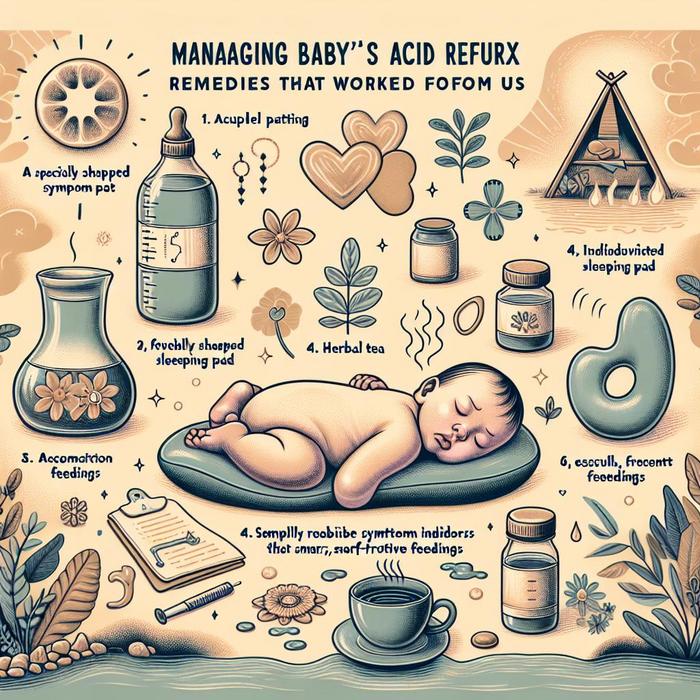Recognizing Symptoms of Baby Acid Reflux
Baby acid reflux, also known as gastroesophageal reflux (GER), is a common condition affecting many infants. It can often be challenging as a parent to identify the symptoms of this condition in your little one. Here’s how you can tell if your baby is experiencing acid reflux symptoms:
- Consistent spit-up after feeding
- Frequent vomiting
- Restlessness and difficulty sleeping
- Refusal to feed and difficulty eating
- Frequent crying and showing signs of abdominal pain
If you notice these symptoms, it might be time to seek professional advice. Healthcare providers such as NHS and University of Chicago Medicine offer comprehensive information on baby acid reflux and its treatment.
Managing Discomfort: Baby Acid Reflux Treatment
It’s crucial to remember that each baby is unique and what works for one may not work for another. However, some commonly used baby acid reflux treatments have been successful:
- Keeping the baby upright during feeds
- Feeding smaller quantities more frequently
- Burping the baby after every feed
- Using a suitable baby bottle, such as those we recommend in our Safe Baby Bottles Guide
There is also considerable helpful advice on managing discomfort in babies with reflux on websites like Bittylab and HealthyChildren.org.
Home Remedies for Baby Acid Reflux
In addition to the above-mentioned strategies, there are several home remedies that can be beneficial in baby acid reflux treatment:
- Utilizing a pacifier: Sucking on a pacifier can help lower esophageal sphincter muscle tone, reducing the likelihood of reflux.
- Changing your diet: If you’re breastfeeding, try removing potential trigger foods such as dairy and caffeine from your diet.
- Creating a peaceful environment: Establishing a calming and stress-free environment can help manage discomfort. Our Baby-Friendly Play Space guide offers a wealth of information on organizing and childproofing.
Although baby acid reflux can be unsettling for both parents and the baby, the good news is that most infants outgrow the condition by their first birthday. Since every baby experiences reflux differently, finding the right combination of methods will be instrumental in managing the condition.
The Role of Sleep Habits
Sleep habits can influence baby acid reflux. Laying down after a meal can cause food or stomach acid to back up into the esophagus. One way to mitigate this is to ensure your baby is kept upright during and for a period after feedings.
Babies suffering from GERD-related discomfort may also benefit from elevating the head of the crib or bassinet. Using a foam wedge or blocks can help achieve the desired angle but remember to exercise caution when trying this method, as babies should never be left unattended in this position.
It’s important to note that while it can help to elevate the crib or bassinet slightly, it’s essential never to position your baby on their stomach or side to sleep, as recommended by the Seattle Children’s Hospital. Doing so can increase the risk of sudden infant death syndrome (SIDS).
When to Seek Professional Help
If your baby’s symptoms persist, or they are refusing to eat and steadily losing weight, it may be time to consult with a pediatrician who can help guide you towards a suitable treatment plan. They can run tests or refer you to a specialist at a reputable institution such as Nationwide Children’s Hospital or Mayo Clinic to see if GERD is truly the cause.
Typically, treatment includes making simple changes to feeding and positioning practices. However, if these efforts prove insufficient, medication or minimally invasive procedures may be considered.
Natural Remedies and Therapies
Parents who prefer a natural approach will be pleased to know there are options worth considering. Chiropractic care, acupuncture, and dietary changes are all therapies that have shown promise in alleviating symptoms of baby acid reflux. As with any new treatment, it is important to always consult with a doctor before starting.
Understanding and Patience Are Key
As a parent, dealing with a baby experiencing acid reflux can be stressful. The task of identifying the problem, finding a solution, and seeing it through requires patience.
Remember that what works for one baby might not work for another. Trial and error can be frustrating, but with time and understanding, relief can be found. For further advice and assistance, WebMD offers an excellent resource for managing baby acid reflux.
Rest assured that most babies will outgrow this discomfort as their digestive systems mature, typically by their first birthday. Until then, the tips and treatments outlined in this guide can make the journey smoother and less stressful for both you and your baby.

